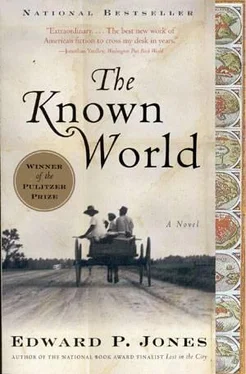He didn’t pay much attention to the first crack of thunder, but the second one pulled his head around. He was in time to see the nearest tree in the woods shudder, stop, then shudder again. An oak tree. Moments later, he could see the first crow flying as if upside down, heading toward the ground, two or three feathers fluttering after the body. The second crow flying upside down told him it wasn’t flying but death that had hold of them both. It took less time for him to blink the rain out of his eyes before the second crow joined the first on the ground, followed by more feathers. If they made a sound as they fell, the rain was too loud for him to hear it.
The top third of the oak tree was now a glorious blaze of yellow light, as though a million candles had been placed in it. The lightning had struck the birds and Stamford could see that it was now blazing up there at the top of the tree, hungry for some more. It occurred to him that the tree was very tall, and that if a man managed to climb up to the top, he could jump and die real good. Very slowly, as he watched, the lightning of the million candles came together to form one six-foot pulsating line of blue fire that he could see through the leaves and the branches. The lightning began to ease itself down the tree, staying close to the trunk as it burned everything in its way, leaves and limbs and branches and anything that might have made a home in the tree. Finally, the lightning stood at the base of the tree, still blue, still pulsating, still six feet.
Stamford set the bucket down and went toward the lightning, toward his death.
Before he had gone very far, he turned and looked at the bucket of blueberries, which was tilting because he had unknowingly put it on a small clump of dirt. If someone was to find it and know who should have it, then the bucket should sit up straight and be closer to the quarters, to the children. He went back and moved the bucket some ten feet closer to the quarters. The rain never let up.
The lightning had not moved, and as Stamford ran toward it, the lightning flowed down to the ground so that it was now a line of fire laid out across the grass, which did not burn. Stamford ran faster. When he was some five feet from the lightning and the woods, the lightning shot off away from him and stabbed itself into another tree, splitting that tree in half. Stamford arrived just in time to see the tree come apart and the two equal parts decide to go their separate ways. A punishing sadness took hold of him. Every day it was one damn thing after another.
The rain continued and the storm moved away from him, toward the cabins. The crows were at his feet. Stamford knelt. While the birds had fallen in deathly disarray, something had come along and laid them out nicely on the ground-feathers collected from all about and put back on their wings, their eyes closed, black bodies and wings glistening as though with life. Nothing burnt. They lay side by side, just as they must have perched side by side before death snuck up on them. They had never had such a pretty look in life, Stamford thought. And even if they came back to life, this, at that moment, was the best they would ever look. Now all they needed was for someone to come along and provide them each with a tiny coffin.
Stamford licked his fingers and rubbed them on each bird. “I just need a little to get me over to the other side,” he said to the first crow. He closed his eyes and waited for death. He began talking to the second bird, “Now don’t be stingy with what you got.” He continued to rub his fingers on them and lick his hand. He talked to each bird separately, as if the history he had with one was distinct and different from the one he had with the other. To speak to them as a couple, as one unit, would be disrespectful to the history he shared with either. He continued licking his fingers and touching the birds, but neither bird seemed very interested in sharing its little piece of death. “Thas all right, old bird. I won’t fault you,” he said to the first crow. “I can understand that you just had anough for yourself,” he said to the second bird. “I won’t grudge you that.” He felt something heavy and not rainlike fall on him and he touched the top of his head. He pulled down what he began to realize were the yolks of eggs. Then, bits of eggshells fell into his open hand, dull green pieces that were spotted dark brown. He looked up and more of the eggs and shells fell, along with twigs and sticks that had been the nest of the crows. He considered the shells and the yolks for quite some time, and all the while the rain continued. He looked about as if someone had called his name. Then he took some of the eggshells and tucked them under each of the birds’ left wings. He rubbed the yolks over their bodies. And when he was done, the ground opened up and took the birds in. He cried.
This was the beginning of Stamford Crow Blueberry, the man who went on with his wife to found the Richmond Home for Colored Orphans. In 1909 the colored people in Richmond unofficially renamed a very long street for him and his wife, and year after year for decades those people petitioned the white people who ran the government of Richmond to make the name official. In 1987, after a renewed drive for renaming led by one of Delphie’s great-granddaughters, the city of Richmond relented, and it put up new signs all along the way to prove that it was official.
Stamford walked back to the bucket of blueberries and knelt and immediately began to feel that maybe the bucket didn’t have enough. But the children had been waiting a long time and he didn’t want to disappoint them. He shook the bucket, thinking that might make it look fuller. It helped, but not by much. Maybe the boy might be fooled that it was a full bucket, but the girl knew things and she would know he had failed to bring a full bucket. His shoulders sagged, and the rain continued. He saw one blueberry rolling down a little hill in the bucket and he caught it. He held the berry between his fingers, began to squeeze it. It bled a little juice. The blueberry was now no good for any child and he regretted having squeezed it. Not to let it go to waste, he put it in his mouth. It wasn’t bad but he could never make a life of eating the things-God had given him a head full of good teeth, but not a one of them was sweet. What the hell had happened to that full bucket? He chewed and swallowed the blueberry, and then he raised his eyes to see a cabin flying his way through the rainy air. It was not moving in any threatening way and so Stamford was not afraid. But he did stand up.
The cabin continued on and settled itself on the ground not ten feet from him. The door opened and Delores was standing in the doorway, her hands behind her back, quite pleased with herself in that way of little girls who had a secret they were dying to tell. She opened her mouth, her teeth and tongue stained blue, a girl happy with her blueberries. Her brother Patrick appeared beside her and he opened his blue mouth to show his happiness as well. Then, just like that, the boy shut the door hard. It wasn’t a comment on Stamford: Despite what his sister always said about him, he didn’t need to be told something three times. The cabin rose and rose and went back the way it had come. The closed door must have acted like a kind of eye because the cabin turned around so the door could see the way back to the quarters.
In 1987, the city of Richmond had just hired a young woman from Holy Cross College and that woman’s first assignment was to design a sign that could contain the names of Mr. and Mrs. Blueberry. Delphie’s great-granddaughter, who was on the city council, wanted both names on the street signs, not just something like “Blueberry Street.” The black woman from Holy Cross did well, and the night of the day she completed her task, she called her mother in Washington, D.C., and read to her what she had managed to fit on one sign-Stamford and Delphie Crow Blueberry Street.
Читать дальше












